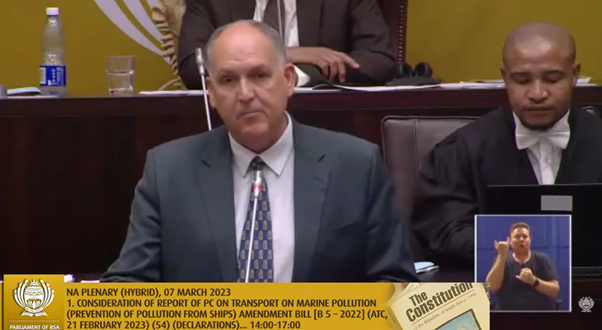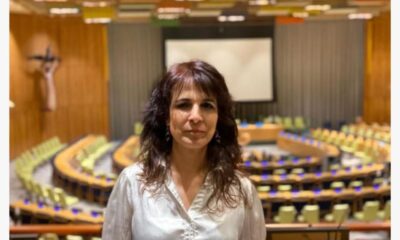
News

Vote to downgrade embassy – a ‘slap in the face’
The Israel ministry of foreign affairs has lashed out at the South African government for its vote on Tuesday, 7 March, to downgrade its embassy in Israel, describing the move as “disgraceful”.
The South African Jewish community was dealt an emotional and psychological blow as political parties voted in favour of a parliamentary motion brought by the National Freedom Party (NFP) for the downgrade. The NFP holds just two seats in the National Assembly.
It brings to realisation the African National Congress (ANC) 2017 conference resolution to downgrade the embassy in Tel Aviv to a liaison office, followed by the 2018 decision to recall the South African ambassador, who has never returned.
Since then, the South African mission continued to have full embassy status but it has undergone a gradual stripping of resources, remaining in limbo. A cabinet ratification of this vote down the line will signal the final blow.
The development has been met with a deep sense of disappointment, disquiet, and anger within the community, other religious groups, politicians, and business leaders. They all agree that South Africans “deserve better”.
Sources in the Israeli ministry told the SA Jewish Report that the “symbolic resolution didn’t contribute in the least to the promotion of any viable solution in the Middle East”.
“At a time when many African and Muslim countries are strengthening and deepening ties with the state of Israel for the benefit of everyone’s common interests, it’s unfortunate that South Africa continues to adhere to an anachronism and the deterioration of relations, a move that will only harm South Africa itself and its standing,” the source high up in the ministry said.
Political analysts agree that the move won’t hurt Israel in any way, considering that South Africa has made itself an “irrelevant player” in the Middle East peace process and is a minor trade partner.
However, they believe it will have a “profound impact” on members of the Jewish community, who may question their future in a country so openly hostile to the Jewish state. It may also act as a driving force for Jews to leave, taking with them entrepreneurial expertise and the potential for much needed local job creation.
The irony of the vote falling on the Jewish festival of Purim – when Jews were saved from genocide in Persia – wasn’t lost on communal leaders. They collectively exclaimed that parliament “picked this day, of all days” to target and sanction the world’s only Jewish state, whose existence serves to prevent another genocide against the Jewish people.
While the NFP’s motion was met with opposition in parliament by representatives from the Democratic Alliance (DA), African Christian Democratic Party, Inkatha Freedom Party, and Freedom Front Plus, who united to voice their “vociferous” opposition to the move, it didn’t garner enough votes.
Rowan Polovin, the national chairperson of the South African Zionist Federation (SAZF), said the motion didn’t represent the voice of most South Africans, who held no ill-will towards Israel, and it should be viewed as a purely symbolic and domestic act by “narrow-minded political actors”.
In a statement released by the SAZF, he said, “Its only achievement is to diminish South Africa’s international standing and ability to play any meaningful role in resolving the Palestinian-Israeli conflict. Business relations and travel between South Africa and Israel will remain intact, while Israel continues to normalise relations with a number of other countries in the Middle East and Africa.”
Polovin said that though the motion would have no effect on Israel, it sent a worrying message to South African Jews, Christians, and Muslims wishing to travel or make a pilgrimage to the holy land for religious reasons. “It’s a blatant attempt by parliament to encroach upon the religious rights and freedoms of all South Africans that are enshrined by our Constitution,” he said.
The ANC government had created a foreign policy that aimed to befriend dictatorships and bash democracies, Polovin said. “It obsesses over Israel, which is the size of our Kruger National Park, and at the same time, hosts navy war drills with Russia, responsible for horrific war crimes and the deaths of thousands of innocent Ukrainian civilians over the past year.”
Professor Karen Milner, the chairperson of the South African Jewish Board of Deputies (SAJBD), described the vote as a “gratuitous slap in the face” for Israel’s many supporters in South Africa.
“For the Jewish community in particular, it was deeply disquieting to witness the overtly hostile, undiplomatic, and above all blatantly discriminatory treatment to which Israel was subjected in this country’s foremost law-making chamber,” she said.
In a statement, the SAJBD said the passing of the resolution, while framed as a gesture motivated by human rights, was in reality “driven by an obsessive enmity towards the world’s sole Jewish nation state and a desire to undermine and harm South Africa’s own best interests”.
“Over the decades, South African Jewry has been confronted by many attacks on its beliefs and threats to its well-being. Through all of them, the community remained resilient and unbowed. The SAJBD has no doubt that notwithstanding the shameful farce that played out in parliament, our community won’t be swayed from its deep-rooted connections, and will continue to stand up for its deeply-held heritage with resilience and with pride,” said the statement.
Four Jewish DA members of parliament bemoaned the outcome. Glynis Breytenbach described it as “deeply saddening”.
“This isn’t reflective of the views of many people either in the government or amongst the voters who put these representatives into office,” said Madeleine Hicklin. “It’s even more sad that it was initiated by a party with only two seats in parliament, but which plays into the hands of the ANC and its acolytes who have no intention of thinking for themselves and who buy into the political theme of ‘apartheid Israel’ at all costs.”
The DA’s Darren Bergman, the party’s shadow minister of international relations, said the country would “suffer further alienation in trade and technological advances all because politicians are exploiting the plight of people in other continents to cause wedge issues in South Africa when they cannot even look after their own citizens. Sadly, no-one won today, but I can assure you millions lost.”
“The ultimate loser will be South Africa, which has so much to gain from Israeli innovation and development. This idiotic move is self-destructive,” said the DA’s shadow minister for employment and labour, Michael Bagraim who described the development as a tragedy for South Africa.
“As usual, the ANC and its allies are only punishing South Africa itself and South African nationals who need active embassies to provide services and promote exports and SA’s global interests,” said Arthur Lenk, a former Israeli ambassador to South Africa. “As for Israel, almost no-one notices or cares whether there is a South African ambassador here or not as we are busy with our deepening relations with the vast majority of African countries and a growing number of our neighbours throughout the Middle East. So, Israel will continue to go forward, building its economy and national interests across Africa and around the world. We will be just fine, thank you very much.”
Steven Gruzd, an analyst at the South African Institute of International Affairs, said the development was likely to make the community feel “uncomfortable” and that “questions about whether to remain here might surface at a time when skilled South African Jews are taking their skills elsewhere at a rate of knots”.
Political analyst Daniel Silke said it was an unfortunate foreign policy decision on the part of the ANC, which further shifts the government towards a one-sided approach in the Middle East, removing it from having any kind of mediation role “even if it wanted one in its wildest dreams”.
Silke said he didn’t believe the government would go so far as to expel the Israeli ambassador, but the situation would remain “tense and unpleasant”. “For as long as the ambassador can remain in South Africa, I suspect he will,” he said.
The Israeli ambassador to South Africa, Eli Belotserovsky, declined to comment.











Aubrey
March 9, 2023 at 4:54 pm
So the Jews fought the battle to end apartheid and the DISONORABIL MEMBERS do what they always do…..screw it up. What stupid ignorant and disgusting behaviour of the SA government.
Thembaletu
July 3, 2023 at 7:46 pm
Well every country has its foreign policy, SA has its own also, the DA is western puppet. SA stands on the side of Philistine, so as Isreal has stood on the side of Ukraine, it’s simple, If we were to take to take a hostile approach to either China or Russia, we’d also loose skilled Russians and Chinese, so let you’ll not feel so special you are just like any other country in this world, and if you do wrong, you must be called out, so SA’s Foreign Policy is but good, Tit for Tat we are not the West.
David Metast
October 17, 2023 at 11:20 pm
Better to not be tied to the fascist apartheid state of Israel #freepalestine